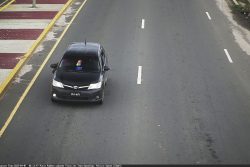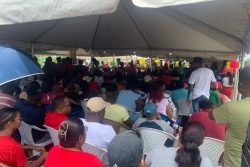The Guyana Revenue Authority (GRA) has removed its dress code.
“We don’t want the taxpayers to feel as if we are turning our backs on them… and more so if they are coming to pay their revenues,” Chairman of the GRA Board Rawle Lucas told Stabroek News yesterday.
The GRA was one of many government agencies countrywide that enforced a strict dress code that prohibited, among other things, torn clothing, armless clothing, slippers, short pants in the case of both men and women as well as tights and short skirts.
With its new posture, the GRA now joins the Guyana Lands and Surveys Commission (GL&SC) as government agencies that have relented on the enforcement of the code.
Security personnel at GRA recently barred one woman from entering because she was wearing a pair of vintage jeans, which had two cuts at the knee caps, while a senior citizen was told he could not enter with his slippers, although he explained that that there was a medical problem with one of his toes.
“De rules is the rules and you can’t blame me,” a female security guard told this newspaper at the time.
However, yesterday persons entered the revenue agency freely and when Stabroek News queried about the change, one of the security guards rolled her eyes, contorted her face and said, “Ask the big ones dem.”
This newspaper was reminded by other security personnel that persons would still be subject to checks of bags and body scans, if necessary, prior to entry.
For Georgetown resident Elise Waithe and Berbician Necia Permaul, the removal of the code was welcomed news. “I came with this jacket to throw over but then the guard tell me was all right and I could go in,” Permaul said.
“It is about time. I can’t believe they stuck to that foolishness for so long. This place is very hot and you can’t expect everyone to be wearing long sleeves and covered shoes… you feel this sun?” Waithe added.
Lucas said that the decision by the GRA to remove the dress code was taken because of, among other factors, the numerous complaints he had received, especially from visitors based in the Diaspora and locals travelling long distances to transact business.
“We are not going to turn away money… dress for some people represents a matter of convenience. You might have come from Linden and the next person don’t want to spend $2,000 to come to town to just do a small set of business and they ask somebody who is already in town to do it for them. That person can’t because …of how they are dressed and I am saying we should not do that,” the GRA Chairman asserted.
“We should make it more convenient for our taxpayers as much as we are collecting money from them, we are also providing a service to them. We must provide the service for them. We must not stop them because of their clothes,” he added.
He also pointed to the many vendors, especially in the city, while saying that for most they would be attired in clothing that would be comfortable to their work but would not meet the agency’s standards of dress.
“We have a lot of market vendors who don’t necessarily dress to meet the code right, and if that person want to leave their stall with someone to run over to GRA to make a payment, transact their business, we can’t be asking them to run home change and come again and so forth. You want people to be able to pay their taxes,” Lucas said.
The GRA’s move follows the GL&SC, whose head, Trevor Benn, decided upon his appointment to the agency, back in May, that it would be flexible with its application of the dress code. “We took the decision to, I don’t know if you would call it relax the dress code but to accept persons… once they passed the security requirements,” Benn had told this newspaper.
“Most of the persons who are coming here are coming to transact business, pay their leases and so on… we must remember too that they are mostly farmers and some would have travelled long distances. For us to then turn them back because they have on an armless shirt, or are in slippers or rain boots would be us denying ourselves that transaction for which they came …we are not going to refuse money. We are right now short strapped for money, so it would be foolish…,” he said.
Benn, who worked with the United Nations Development Programme here for years and has travelled the world extensively, referred to other Caribbean countries where persons are permitted to enter government buildings in armless shirts or dresses or, sometimes, flip flops on their feet.
“You have to remember this is a tropical country and with the weather here, it is understandable that persons would want to wear cool clothing…,” he pointed out.
The stringent dress codes for entry into government buildings has been the topic of much discussion in the public and on social media recently.
It was brought back to the fore last week when Guyana Chronicle columnist Akola Thompson was denied entry to the National Communications Network (NCN) compound because she was clad in an armless dress. The dress code, however, did not list armless clothing as a prohibition.
Thompson subsequently took to social media and blasted the enforcement of dress codes across the country by many government organisations.







